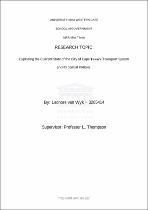| dc.contributor.advisor | Thompson, Lisa | |
| dc.contributor.author | van Wyk, Leonore | |
| dc.date.accessioned | 2022-03-30T08:09:10Z | |
| dc.date.available | 2022-03-30T08:09:10Z | |
| dc.date.issued | 2021 | |
| dc.identifier.uri | http://hdl.handle.net/11394/8988 | |
| dc.description | Magister Philosophiae - MPhil | en_US |
| dc.description.abstract | There are many reasons why Cape Town is the most congested city in South Africa besides there just being “too many cars on the roads”. This paper explores Cape Town’s transport system and spatial policies and how it impacts traffic congestion as traffic congestion serves as a primary indicator of poor spatial planning and development. A desktop study was conducted with secondary data being utilized. The City of Cape Town is aware of the issue of traffic congestion and the impact that it has on commuters, especially those with little financial means. There are numerous policies and frameworks in place to combat the issue of traffic congestion, but corruption and the politicization of spatial planning hinders the resolution of the problem. | en_US |
| dc.language.iso | en | en_US |
| dc.publisher | University of the Western Cape | en_US |
| dc.subject | Congestion | en_US |
| dc.subject | Public transport | en_US |
| dc.subject | Transportation | en_US |
| dc.subject | Spatial planning | en_US |
| dc.subject | Urbanization | en_US |
| dc.title | Exploring the current state of the City of Cape Town’s transport system and its spatial policies | en_US |
| dc.rights.holder | University of the Western Cape | en_US |

